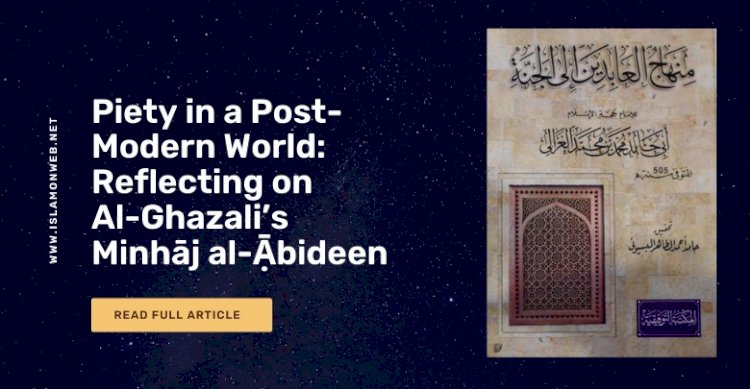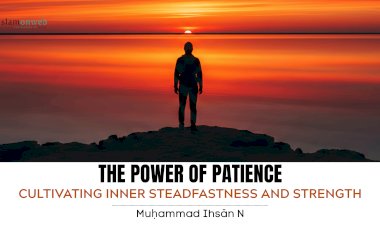Piety in a Post-Modern World: Reflecting on Al-Ghazali’s Minhāj al-Ạ̄bideen
Mesmerized by rationality and enslaved by technology, the world has become a farrago of order and chaos. A place where people succumb to manufactured-mass-consent and individuality dies a slow death. The world has not seen an age darker than today where culture and morality are things of the past. In these unusual circumstances, it has become even more cumbersome for a Muslim to reach his spiritual zenith, clear his mind of the world and focus on the Divine. But, is there a way to surpass these obstacles and reach the ultimate stage of worship? Let us find out.
We are aware that the global landscape is changing at an alarming rate. Governments legitimize homosexuality, alcohol is becoming a part of the 'new-normal', and illicit sexual activities are encouraged. Detrimental to a Muslim's faith, normalization of sinning is becoming the stereotype of our time. Not only this, Muslim acts of worship and identity are being banned in many places. For instance, France prohibited the wearing of Islamic headscarves in state schools in 2004. In 2010, it banned the niqab, the full-face Islamic veil, in public places such as streets, parks, public transport, and administrative buildings [1] or the Chinese government's ban on Islamic beard and Veil to the Uighurs in the Xingang region.[2]
And if this wasn’t enough, the Capitalistic world has also shoved towards us a series of distractions, strong enough to keep anyone from worshipping. Be it the “short-video” apps or the multi-player gaming frenzy, the limbo of perfect selfies or the personalized music platforms. Feeding off our teenagers' low self-esteem and dwindling self-control, these structures are earning a healthy fortune for themselves.
Luckily for Muslims, our foresighted scholars left a rich literary heritage for us to be used should these conditions arise. One of such scholars, the great Sufi of the 12th century, Imam Al-Ghazali (d. 1111 A.D), wrote a profound treatise on worship and its obstacles. He named the book “Minhāj al-Ạ̄bideen” The Paths of the Pious, wherein he mentioned the hindrances which keep a man from reaching his spiritual zenith in sincere worship. Looking at Imam's masterpiece in today's world, his findings have become even more relevant and should be widely adopted. Here, I am producing the essence of what he wrote in his three-hundred paged magnum opus.
The book opens with a magnificent preface, where the Imam mentions his observation of the path of worship, in his words: “When I looked closely into this path and pondered over it thoroughly, I found that it is a very difficult arid hazardous path to follow. It is a path full of very wide and arduous valleys and is blocked with hurdles and calamities. Highway robbers and hidden enemies both Self and Satan are lying in ambush. There are only a few friends and helpers. As this is the path leading to Paradise, the garden of Eden, it should indeed be difficult and hazardous.” [3] Such is the condition of the path one needs to tread, another critical aspect of human life he states: “Apart from this, it is another problem that by his nature man is very weak and the world is brought with all kinds of difficulties. Religious matters require full-time attention and man has inadequate spare time at his disposal for all this on account of his occupation with worldly affairs. Life is short and the calamities of the times are very severe and death is nearby” [4]. Being the situation as it be, it is true when he says: “Those desiring to take this path are very few. Fewer still among these are those who put into practice their intention with firm resolution. Those who are able to reach their goal are much fewer. However, those who reach the desired goal are honorable servants whom Exalted Allah has chosen for his acquaintance and relationship. It is He who helped and protected them and admitted them into Paradise by his mercy and grace. May Exalted Allah include us all by his mercy, among such successful fortunate persons.” [5]
Now, the steps he mentions for a true seeker to reach his destination are indeed relevant in our times, and if we sincerely ponder over them, we too can find our true purpose in life; He says: "When the intention of taking the path of worship arises in a man's heart, he begins to think that he has been enriched with the blessings of Exalted Allah, viz., life, strength, wisdom, power of speech and many other blessings and means of comfort, bestowed upon him by Allah. With these, he protects himself from troubles, losses, distresses and calamities. So, he begins to believe that there must be some being who has granted him all these blessings and bounties and that, if he is not grateful and obedient to that Being, He will afflict punishment on him and take away his blessings.
He also begins to think that the true benefactor (Allah) has sent Prophets (upon them be peace) to furnish to the people knowledge about him. These Prophets (upon them be peace) displayed, with the help of Allah, supernatural miracles lying beyond human power and capacity. These Prophets (upon them be peace) taught the people that theirs is only one Sustainer, the Lord who has power over everything. He is All-Knowing, Everlasting and Eternal. He has asked you to do good deeds and refrain from sins and vices. He can punish those who are disobedient and reward those who are obedient. He knows the secrets of the hearts and the notions passing through them. He has promised to grant salvation and rewards. He has also warned the people against His punishment and torment. He has commanded them to be regular in abiding by the injunctions of the Shariah." [6]
When a seeker ponders over these facts, he begins to tremble with fear and worldly thoughts exit his mind, this trembling and fear create a sense of anxiety to save oneself, and this is the first step of Divine guidance. This craving to please his Lord and refrain from calling upon his wrath drives a man towards worship. But, when one intends the same, he finds himself ignorant of the commandments of the Shariah and the delicacies of worship. Hence, he needs to surpass the first valley, which the Imam named “Valley of Knowledge and Acquaintance”. It is quite easy compared to the previous eras to pass this valley in our time. Technology has enabled mass transmission of knowledge through the internet in a matter of seconds. Many organizations/scholars/researchers strive to provide people with knowledge through courses, training camps, lectures, and sermons to the Islamic way of life. Moreover, enormous volumes of books can be carried in a pocket-sized mobile and read at will. One can pass this valley through these facilities.
While he is learning the primary knowledge about the Shariah, he remembers the countless Sins he has committed in his life. Hence the next step is to cross the "Valley of Repentance” to surpass this. He needs to sincerely repent to Allah and purify himself of all the sins he has committed. When he tries to repent and is in the process of purification, another stage comes before him, “The Valley of Obstacles”, this is where the outward and inward forces stop him in his path. The external forces are four:
(*) The World (*) The Creatures (*) The Self (*) Satan
The World lures and charms him while the creatures in it distract and misguide him, Satan constantly whispers in his heart, and the Self keeps pushing towards Sins. To transcend them, he needs to renounce the world, seclude the creatures and fight Self and Satan with firm resolution and determination. The inward forces are these:
(*) Sustenance (*) Fears and Misgivings (*) Hardships and Calamities
Sustenance always remains an unending battle for him. At the same time, his fears and misgivings demotivate him; hardships and calamities on the top of it (like diseases and illness or worldly accidents) also hinder the path to worship. To pass them, one needs to trust the Divine and always be content with the Divine decree. This will enable him to steer clear through these inward hindrances.
When one surpasses these valleys, he is faced with the problem of two extremities, either being so afraid of the Hellish tortures that he gives up hope in Allah’s mercy or being so reliant on Allah’s mercy that he considers himself saved and gives up worship. This “Valley of Urge and Impetus” must be crossed by him through the right and balanced amount of (*) Hope in Allah’s mercy and (*) Fear of Allah’s wrath.
This is the point where he starts worshipping. Still, he must now learn to protect his worship and cross the “Valley of Things which ruin worship” he needs to be sincere in his acts and credit everything to the Divine guidance and not his splendour. Boastfulness and Pride are two things that ruin worship, which can be overcome by sincerity and humbleness.
When a man manages to pass all of these valleys, he can successfully enter “The Valley of Praise and Thanksgiving”, the final stage where he needs to praise his Lord for his guidance and thank him for his mercy. Such a man has become a sincere worshiper of his Lord and has reached his ultimate purpose and will dwell in the beautiful abode of paradise eternally.
My Dear Readers, the discourse above is relevant as it is in our time, a scale through which we all need to judge ourselves and see if we have even begun our journey towards worship? If yes, in which valley are we present and what do we need to do to get out of there. The path of worship is indeed cumbersome. But the reward for it is eternal peace, paradise and most of all, the Divine Pleasure of the Almighty.
May Allah make us from his dutiful bondmen! Ameen!
References and Citations:
[1] Reuters, Official Website, Article: “Hands off my hijab! Young Muslim women protest proposed French ban”, Published May 4, 2021, Link.
[2] BBC, Official Website, Article: “China Uighurs: Xinjiang ban on long beards and veils”, Published: April 1 2017, Link.
[3] Al-G̣hazālī; Muḥammad; Minhāj al-Ạ̄bideen; English Edition; Translated by Iqbal Hussain Ansar; Published Dar ul-Ishaat Karachi; 1998; pg. 9]
[4] ibid pg. 10
[5] ibid pg. 10
[6] ibid pg. 11
Fardeen Ahmad Khan Razvi is a renowned Oriental Research Scholar who has authored over a hundred articles and twenty-plus booklets on Islamic and Oriental subjects in Arabic, English, Urdu and Hindi languages. His minor is in Computer Applications pursuing his Major in Data Science. He is also an eloquent Urdu poet coming from a Sufi background in Northern India.
Disclaimer
The views expressed in this article are the author’s own and do not necessarily mirror Islamonweb’s editorial stance.
























Leave A Comment